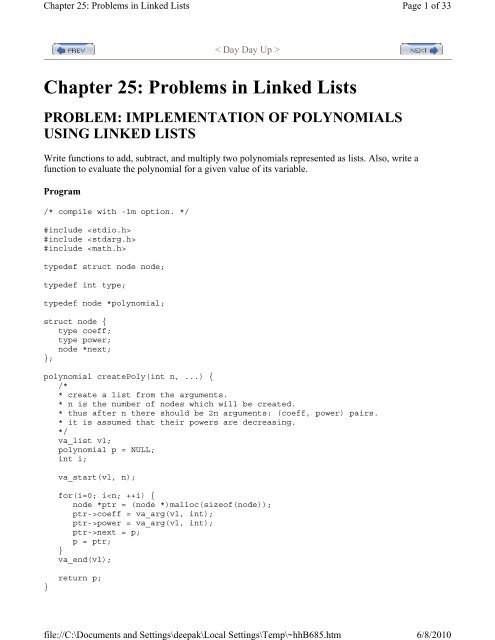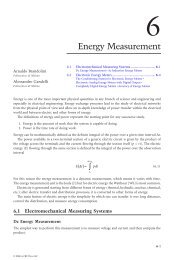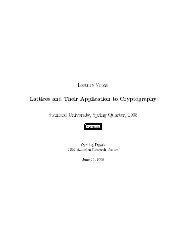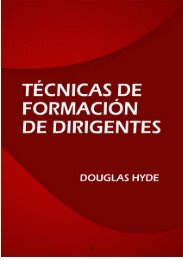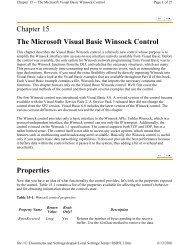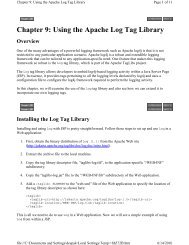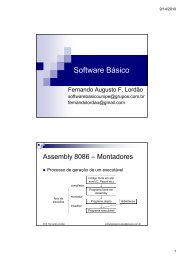Chapter 25: Problems in Linked Lists - BeKnowledge
Chapter 25: Problems in Linked Lists - BeKnowledge
Chapter 25: Problems in Linked Lists - BeKnowledge
Create successful ePaper yourself
Turn your PDF publications into a flip-book with our unique Google optimized e-Paper software.
<strong>Chapter</strong> <strong>25</strong>: <strong>Problems</strong> <strong>in</strong> L<strong>in</strong>ked <strong>Lists</strong><br />
<strong>Chapter</strong> <strong>25</strong>: <strong>Problems</strong> <strong>in</strong> L<strong>in</strong>ked <strong>Lists</strong><br />
PROBLEM: IMPLEMENTATION OF POLYNOMIALS<br />
USING LINKED LISTS<br />
Write functions to add, subtract, and multiply two polynomials represented as lists. Also, write a<br />
function to evaluate the polynomial for a given value of its variable.<br />
Program<br />
/* compile with -lm option. */<br />
#<strong>in</strong>clude <br />
#<strong>in</strong>clude <br />
#<strong>in</strong>clude <br />
typedef struct node node;<br />
typedef <strong>in</strong>t type;<br />
typedef node *polynomial;<br />
struct node {<br />
type coeff;<br />
type power;<br />
node *next;<br />
};<br />
polynomial createPoly(<strong>in</strong>t n, ...) {<br />
/*<br />
* create a list from the arguments.<br />
* n is the number of nodes which will be created.<br />
* thus after n there should be 2n arguments: (coeff, power) pairs.<br />
* it is assumed that their powers are decreas<strong>in</strong>g.<br />
*/<br />
va_list vl;<br />
polynomial p = NULL;<br />
<strong>in</strong>t i;<br />
}<br />
va_start(vl, n);<br />
for(i=0; icoeff = va_arg(vl, <strong>in</strong>t);<br />
ptr->power = va_arg(vl, <strong>in</strong>t);<br />
ptr->next = p;<br />
p = ptr;<br />
}<br />
va_end(vl);<br />
return p;<br />
< Day Day Up ><br />
file://C:\Documents and Sett<strong>in</strong>gs\deepak\Local Sett<strong>in</strong>gs\Temp\~hhB685.htm<br />
Page 1 of 33<br />
6/8/2010
<strong>Chapter</strong> <strong>25</strong>: <strong>Problems</strong> <strong>in</strong> L<strong>in</strong>ked <strong>Lists</strong><br />
void pPr<strong>in</strong>t(polynomial p) {<br />
node *ptr;<br />
}<br />
for(ptr=p; ptr; ptr=ptr->next)<br />
pr<strong>in</strong>tf("%dx%d + ", ptr->coeff, ptr->power);<br />
pr<strong>in</strong>tf("\n");<br />
polynomial pSub(polynomial p1, polynomial p2) {<br />
/*<br />
* return p1-p2 recursively.<br />
*/<br />
node *ptr = (node *)malloc(sizeof(node));<br />
}<br />
if(p1 && p2 && p1->power == p2->power) {<br />
ptr->coeff = p1->coeff - p2->coeff;<br />
ptr->power = p1->power;<br />
ptr->next = pSub(p1->next, p2->next);<br />
}<br />
else if(p1 && ((p2 && p1->power < p2->power) || !p2)) {<br />
ptr->coeff = p1->coeff;<br />
ptr->power = p1->power;<br />
ptr->next = pSub(p1->next, p2);<br />
}<br />
else if(p2 && ((p1 && p1->power > p2->power) || !p1)) {<br />
ptr->coeff = -p2->coeff;<br />
ptr->power = p2->power;<br />
ptr->next = pSub(p1, p2->next);<br />
}<br />
else { // p1 == p2 == NULL.<br />
free(ptr);<br />
return NULL;<br />
}<br />
return ptr;<br />
polynomial pAdd(polynomial p1, polynomial p2) {<br />
/*<br />
* return p1+p2 recursively.<br />
*/<br />
node *ptr = (node *)malloc(sizeof(node));<br />
if(p1 && p2 && p1->power == p2->power) {<br />
ptr->coeff = p1->coeff + p2->coeff;<br />
ptr->power = p1->power;<br />
ptr->next = pAdd(p1->next, p2->next);<br />
}<br />
else if(p1 && ((p2 && p1->power < p2->power) || !p2)) {<br />
ptr->coeff = p1->coeff;<br />
ptr->power = p1->power;<br />
ptr->next = pAdd(p1->next, p2);<br />
}<br />
else if(p2 && ((p1 && p1->power > p2->power) || !p1)) {<br />
ptr->coeff = p2->coeff;<br />
ptr->power = p2->power;<br />
ptr->next = pAdd(p1, p2->next);<br />
}<br />
else { // p1 == p2 == NULL.<br />
free(ptr);<br />
file://C:\Documents and Sett<strong>in</strong>gs\deepak\Local Sett<strong>in</strong>gs\Temp\~hhB685.htm<br />
Page 2 of 33<br />
6/8/2010
<strong>Chapter</strong> <strong>25</strong>: <strong>Problems</strong> <strong>in</strong> L<strong>in</strong>ked <strong>Lists</strong><br />
}<br />
return NULL;<br />
}<br />
return ptr;<br />
void pInsertOrAdd(polynomial p, node *ptr) {<br />
/*<br />
* p->next anytime conta<strong>in</strong>s a partial product.<br />
* add ptr at appropriate place <strong>in</strong> it keep<strong>in</strong>g powers <strong>in</strong> order.<br />
*/<br />
node *curr, *prev;<br />
for(prev=p, curr=prev->next; curr && curr->power < ptr->power;<br />
prev=curr, curr=curr->next)<br />
;<br />
// prev will always be NON-NULL :).<br />
if(curr && curr->power == ptr->power)<br />
curr->coeff += ptr->coeff, free(ptr);<br />
else<br />
prev->next = ptr, ptr->next = curr;<br />
}<br />
polynomial pMult(polynomial p1, polynomial p2) {<br />
/*<br />
* return p1*p2.<br />
*/<br />
node p3, *ptr1, *ptr2, *ptr;<br />
p3.next = NULL;<br />
for(ptr1=p1; ptr1; ptr1=ptr1->next)<br />
for(ptr2=p2; ptr2; ptr2=ptr2->next) {<br />
ptr = (node *)malloc(sizeof(node));<br />
ptr->coeff = ptr1->coeff * ptr2->coeff;<br />
ptr->power = ptr1->power + ptr2->power;<br />
pInsertOrAdd(&p3, ptr);<br />
}<br />
return p3.next;<br />
}<br />
<strong>in</strong>t pEval(polynomial p1, <strong>in</strong>t x) {<br />
/*<br />
* evaluate p1 at x.<br />
*/<br />
node *ptr;<br />
<strong>in</strong>t result = 0;<br />
for(ptr=p1; ptr; ptr=ptr->next)<br />
result += ptr->coeff * pow(x, ptr->power);<br />
}<br />
return result;<br />
<strong>in</strong>t ma<strong>in</strong>() {<br />
polynomial p1 = createPoly(3, 3, 5, -1, 3, -10, 0),<br />
p2 = createPoly(3, -2, 3, 0, 2, 20, 0);<br />
pPr<strong>in</strong>t(p1);<br />
pPr<strong>in</strong>t(p2);<br />
pPr<strong>in</strong>t(pAdd(p1, p2));<br />
pPr<strong>in</strong>t(pSub(p1, p2));<br />
pPr<strong>in</strong>t(pMult(p1, p2));<br />
file://C:\Documents and Sett<strong>in</strong>gs\deepak\Local Sett<strong>in</strong>gs\Temp\~hhB685.htm<br />
Page 3 of 33<br />
6/8/2010
<strong>Chapter</strong> <strong>25</strong>: <strong>Problems</strong> <strong>in</strong> L<strong>in</strong>ked <strong>Lists</strong><br />
}<br />
Explanation<br />
pr<strong>in</strong>tf("value of p1 at x=%d is %d.\n", 2, pEval(p1, 2));<br />
return 0;<br />
1. A polynomial, such as ax3+bx+c, is represented by us<strong>in</strong>g a l<strong>in</strong>ked list of nodes. Each node<br />
conta<strong>in</strong>s a coefficient and a power of the variable x. Thus this above expression is stored as<br />
follows:<br />
2. The function createPoly() creates a l<strong>in</strong>ked list of the given coefficients and powers sent to the<br />
function, us<strong>in</strong>g the variable number of arguments technique.<br />
3. pAdd(p1, p2) adds polynomials p1 and p2 and returns the sum. It adds coefficients of the nodes<br />
of lists p1 and p2 conta<strong>in</strong><strong>in</strong>g the same power. The nodes <strong>in</strong> p1 and p2 for which there is no node<br />
<strong>in</strong> the other list with the same power is copied to the result as it is. The traversal of p1 and p2 is<br />
done such that the result<strong>in</strong>g list is also sorted based on power <strong>in</strong> ascend<strong>in</strong>g order. This traversal is<br />
done us<strong>in</strong>g recursion. The function pSub() for subtraction is identical. For example,<br />
(3 × 5 + 4 × 3 + 9) + (5 × 3 − 4x) = (3 × 5 + 9 × 3 − 4x + 9)<br />
and<br />
(3 × 5 + 4x 3 + 9) + (5 × 3 − 4x) = (3 × 5 − 1 × 3 + 4x + 9)<br />
4. The function pMult(p1, p2) traverses each node n2 of list p2 for each node n1 of list p1, and<br />
prepares a new node whose coefficient is the product of the coefficients <strong>in</strong> the two nodes n1 and<br />
n2 and whose power is the sum of the powers of n1 and n2. It is possible to get the same result<strong>in</strong>g<br />
power for two multiplications. So the procedure pInsertOrAdd() traverses the result<strong>in</strong>g list p3<br />
for occurrence of the node with the same power. If such a node n3 exists, then the new coefficient<br />
is added to the old coefficient of n3; otherwise a new node with the new coefficient is <strong>in</strong>serted <strong>in</strong><br />
p3. For example,<br />
(3 × 5 + 4 × 3 + 9) × (5 × 3 − 4x)<br />
= (15 × 8 − 12 × 6) + (20 × 6 − 16 × 4) + (45 × 3 − 36x)<br />
= (15 × 8 + 8 × 6 − 16 × 4 + 45 × 3 − 36x).<br />
5. The function pEval(p1, x) evaluates the expression <strong>in</strong> p1 at po<strong>in</strong>t x and returns the value. This is<br />
done by travers<strong>in</strong>g the list p1 once and add<strong>in</strong>g the values coefficient *x power for each node.<br />
For example, the value of the polynomial (3x5+4x3+9) at x=2 is (3*2 5+4*2 3+9) = (96+32+9)<br />
= 137.<br />
6. The complexity of pAdd() and pSub() is O(m1+m2), where m1 and m2 are the lengths of the<br />
<strong>in</strong>put lists. The complexity of pInsertOrAdd() is O(m1+m2). Thus the complexity of pMult() is<br />
O(m1*m2*(m1+m2)). The complexity of pEval() is O(m) where m is the length of the <strong>in</strong>put list.<br />
Po<strong>in</strong>ts to Remember<br />
file://C:\Documents and Sett<strong>in</strong>gs\deepak\Local Sett<strong>in</strong>gs\Temp\~hhB685.htm<br />
Page 4 of 33<br />
6/8/2010
<strong>Chapter</strong> <strong>25</strong>: <strong>Problems</strong> <strong>in</strong> L<strong>in</strong>ked <strong>Lists</strong><br />
1. Polynomials can be represented us<strong>in</strong>g l<strong>in</strong>ked lists. This has the advantage of reduced space if<br />
many of the coefficients <strong>in</strong> the list are zero. Also, the procedures operat<strong>in</strong>g on polynomials<br />
represented by arrays and lists are not different as far as complexity is concerned.<br />
2. To avoid send<strong>in</strong>g a variable number of arguments to createPoly(), an array can be passed as a<br />
parameter.<br />
3. The program should be compiled with the –lm option <strong>in</strong> order to l<strong>in</strong>k libm library for the function<br />
pow().<br />
PROBLEM: IMPLEMENTATION OF CIRCULAR LISTS BY<br />
USING ARRAYS<br />
A l<strong>in</strong>ear list is ma<strong>in</strong>ta<strong>in</strong>ed circularly <strong>in</strong> an array clist[0…N–1] with rear and front set up as for circular<br />
queues. Write functions to delete the k-th element <strong>in</strong> the list and to <strong>in</strong>sert an element e immediately after<br />
the k-th element.<br />
Program<br />
< Day Day Up ><br />
< Day Day Up ><br />
#<strong>in</strong>clude <br />
#def<strong>in</strong>e N 10 // size of the list.<br />
#def<strong>in</strong>e FIRSTINDEX 0 // <strong>in</strong>dex of first element <strong>in</strong> the list.<br />
#def<strong>in</strong>e ILLEGALINDEX -1 // illegal <strong>in</strong>dex - for special cases.<br />
#def<strong>in</strong>e EINDEXOUTOFBOUND -1 // error code on overflow <strong>in</strong> the list.<br />
#def<strong>in</strong>e SUCCESS 0 // success code.<br />
typedef <strong>in</strong>t type; // type of each data item.<br />
type clist[N]; // list implemented us<strong>in</strong>g array.<br />
<strong>in</strong>t front = ILLEGALINDEX; // po<strong>in</strong>ts to first element <strong>in</strong> the list.<br />
<strong>in</strong>t rear; // po<strong>in</strong>ts to last element <strong>in</strong> the list.<br />
<strong>in</strong>t lPush( type data ) {<br />
/*<br />
* appends 'data' to the end of the list if space is available.<br />
* otherwise returns error.<br />
*/<br />
if( front == ILLEGALINDEX ) { // list empty.<br />
front = rear = FIRSTINDEX;<br />
}<br />
else if( (rear+1)%N == front ) { // list overflow.<br />
return EINDEXOUTOFBOUND;<br />
}<br />
else // normal case.<br />
rear = (rear+1)%N; // %N for wrapp<strong>in</strong>g around of <strong>in</strong>dex.<br />
clist[rear] = data;<br />
return SUCCESS;<br />
}<br />
file://C:\Documents and Sett<strong>in</strong>gs\deepak\Local Sett<strong>in</strong>gs\Temp\~hhB685.htm<br />
Page 5 of 33<br />
6/8/2010
<strong>Chapter</strong> <strong>25</strong>: <strong>Problems</strong> <strong>in</strong> L<strong>in</strong>ked <strong>Lists</strong><br />
void lPr<strong>in</strong>t() {<br />
/*<br />
* pr<strong>in</strong>ts elements <strong>in</strong> the list from front to rear.<br />
*/<br />
<strong>in</strong>t i;<br />
<strong>in</strong>t nelem = lGetNElements();<br />
}<br />
for( i=0; i
<strong>Chapter</strong> <strong>25</strong>: <strong>Problems</strong> <strong>in</strong> L<strong>in</strong>ked <strong>Lists</strong><br />
*/<br />
<strong>in</strong>t i, <strong>in</strong>dex;<br />
<strong>in</strong>t nelem = lGetNElements();<br />
pr<strong>in</strong>tf( "<strong>in</strong>sert<strong>in</strong>g %d after %d'th element...\n", data, k );<br />
if( k > nelem || k < 0 || nelem == N )<br />
return EINDEXOUTOFBOUND;<br />
if( nelem == 0 ) // list empty.<br />
front = rear = FIRSTINDEX;<br />
else<br />
rear = (rear+1)%N;<br />
<strong>in</strong>dex = (front+k)%N; // <strong>in</strong>dex at which data should be <strong>in</strong>serted.<br />
for( i=nelem; i>k; -i )<br />
clist[ (front+i)%N ] = clist[ (front+i-1)%N ];<br />
clist[ (front+k)%N ] = data;<br />
}<br />
<strong>in</strong>t ma<strong>in</strong>() {<br />
lInsertAfterK(100,0);<br />
lPr<strong>in</strong>t();<br />
lPush(0);<br />
lPush(4);<br />
lPush(7);<br />
lPush(1);<br />
lPush(13);<br />
lPush(2);<br />
lPush(5);<br />
lPr<strong>in</strong>t();<br />
lInsertAfterK(2,1);<br />
lPr<strong>in</strong>t();<br />
lDeleteK(4);<br />
lPr<strong>in</strong>t();<br />
lPush(6);<br />
lPush(3);<br />
lPush(23);<br />
lPr<strong>in</strong>t();<br />
lDeleteK(9);<br />
lPr<strong>in</strong>t();<br />
lInsertAfterK(20,9);<br />
lPr<strong>in</strong>t();<br />
lDeleteK(10);<br />
lPr<strong>in</strong>t();<br />
lInsertAfterK(20,0);<br />
lPr<strong>in</strong>t();<br />
return 0;<br />
}<br />
Explanation<br />
Page 7 of 33<br />
1. clist[0…N–1] is a global queue of <strong>in</strong>tegers. The rear and front are its two po<strong>in</strong>ters (<strong>in</strong>dices)<br />
ma<strong>in</strong>ta<strong>in</strong>ed for <strong>in</strong>sertion and deletion of elements. The rear po<strong>in</strong>ts to the last element <strong>in</strong>serted <strong>in</strong><br />
the queue while front po<strong>in</strong>ts to the next element to be removed from the queue.<br />
2. An empty queue is represented by front = –1. The front and rear are updated on <strong>in</strong>sertions and<br />
deletions. S<strong>in</strong>ce the queue is circular and the array size is fixed, element e is <strong>in</strong>serted when rear =<br />
N – 1 goes to clist[0], if it is empty. Also, after removal of an element from the queue when<br />
front = N – 1, front po<strong>in</strong>ts to clist[0], if it exists. Thus the <strong>in</strong>dices front and rear wrap around<br />
file://C:\Documents and Sett<strong>in</strong>gs\deepak\Local Sett<strong>in</strong>gs\Temp\~hhB685.htm<br />
6/8/2010
<strong>Chapter</strong> <strong>25</strong>: <strong>Problems</strong> <strong>in</strong> L<strong>in</strong>ked <strong>Lists</strong><br />
<strong>in</strong> the range 0…N – 1.<br />
3. The number of elements <strong>in</strong> the queue at any time (lGetNElements()) can be found us<strong>in</strong>g the<br />
follow<strong>in</strong>g formula:<br />
4. To delete the k-th element (k > 0) (lDeleteK()), it is first checked to see if the number of<br />
elements <strong>in</strong> the queue is less than or equal to k. If there is a k- th element, its <strong>in</strong>dex <strong>in</strong> the array<br />
can be found us<strong>in</strong>g the formula (front+k−1)%N. After deletion of the element, all the elements<br />
after it are shifted back by one position and rear is updated. If k == 1, or if the deleted element<br />
was the last element <strong>in</strong> the queue, then front needs to be updated accord<strong>in</strong>gly. For example, let<br />
the queue look like this:<br />
If k == 5, then after lDeleteK() runs, the queue looks like this:<br />
Note that elements 6 and 7 have been shifted back by one position.<br />
5. To <strong>in</strong>sert an element after the k-th element (k >= 0) (lInsertAfterK()), aga<strong>in</strong> k is checked<br />
aga<strong>in</strong>st the number of elements <strong>in</strong> the queue. The <strong>in</strong>dex for the new element would be<br />
(front+k)%N. To create space for the new element, all the elements after k-th element need to be<br />
shifted foward by one position. The new element can then be <strong>in</strong>serted and the <strong>in</strong>dices front and<br />
rear are updated accord<strong>in</strong>gly. For example, say the queue looks like the follow<strong>in</strong>g:<br />
Then, after lInsertAfterK() is run with k == 4, the queue becomes<br />
Note how the rear is wrapped around.<br />
Page 8 of 33<br />
6. Because of the shift<strong>in</strong>g required <strong>in</strong> <strong>in</strong>sertion and deletion, the time complexity of both the<br />
functions is O(n). We note that if <strong>in</strong>sertions and deletions take place at rear and front, respectively,<br />
the complexity rema<strong>in</strong>s O(1). The constant of proportionality of the complexity can be improved<br />
by check<strong>in</strong>g the number of elements before and after the k-th element and then shift<strong>in</strong>g the smaller<br />
number of the two.<br />
file://C:\Documents and Sett<strong>in</strong>gs\deepak\Local Sett<strong>in</strong>gs\Temp\~hhB685.htm<br />
6/8/2010
<strong>Chapter</strong> <strong>25</strong>: <strong>Problems</strong> <strong>in</strong> L<strong>in</strong>ked <strong>Lists</strong><br />
Po<strong>in</strong>ts to Remember<br />
1. In an array-based circular queue implementation, the <strong>in</strong>dices front and rear wrap around the N<br />
elements.<br />
2. The <strong>in</strong>dex of a k-th element is calculated as (front+k–1)%N.<br />
3. The number of elements <strong>in</strong> the queue is calculated as 0, (rear−front+1), or (N–front+rear+1)<br />
depend<strong>in</strong>g on whether the queue is empty (front == −1). There is no wrapp<strong>in</strong>g of <strong>in</strong>dices (front<br />
rear).<br />
4. To <strong>in</strong>sert an element after the k-th element, all the elements after it should be first shifted forward<br />
by one position. To delete an element at the k-th position, all the elements after it should be<br />
shifted back by one position.<br />
5. Corner cases such as queue full and queue empty should be handled properly.<br />
PROBLEM: REVERSING LINKS IN THE CASE OF<br />
CIRCULAR LIST<br />
Write a function for a s<strong>in</strong>gly l<strong>in</strong>ked circular list that reverses the direction of the l<strong>in</strong>ks.<br />
Program<br />
#<strong>in</strong>clude <br />
#def<strong>in</strong>e SUCCESS 0<br />
#def<strong>in</strong>e ERROR -1<br />
typedef <strong>in</strong>t type;<br />
typedef struct node node;<br />
struct node {<br />
type data;<br />
node *next;<br />
};<br />
node *head = NULL;<br />
< Day Day Up ><br />
< Day Day Up ><br />
<strong>in</strong>t lInsert( type data ) {<br />
/*<br />
* <strong>in</strong>serts a new node conta<strong>in</strong><strong>in</strong>g data at start of the list.<br />
*/<br />
node *ptr = (node *)malloc( sizeof(node) );<br />
ptr->data = data;<br />
if( head == NULL ) { // this is the first element <strong>in</strong> the list.<br />
file://C:\Documents and Sett<strong>in</strong>gs\deepak\Local Sett<strong>in</strong>gs\Temp\~hhB685.htm<br />
Page 9 of 33<br />
6/8/2010
<strong>Chapter</strong> <strong>25</strong>: <strong>Problems</strong> <strong>in</strong> L<strong>in</strong>ked <strong>Lists</strong><br />
}<br />
ptr->next = ptr;<br />
head = ptr;<br />
}<br />
else {<br />
ptr->next = head->next;<br />
head->next = ptr;<br />
}<br />
return SUCCESS;<br />
void lPr<strong>in</strong>t() {<br />
node *ptr;<br />
}<br />
if( head == NULL )<br />
return;<br />
else<br />
pr<strong>in</strong>tf( "%d ", head->data );<br />
for( ptr=head->next; ptr!=head;<br />
ptr=ptr->next ) pr<strong>in</strong>tf( "%d ", ptr->data );<br />
pr<strong>in</strong>tf( "\n" );<br />
}<br />
<strong>in</strong>t lReverse() {<br />
/*<br />
* <strong>in</strong>situ reverses the list.<br />
*/<br />
node *curr, *prev, *next;<br />
pr<strong>in</strong>tf( "revers<strong>in</strong>g list...\n" );<br />
if( head == NULL )<br />
return SUCCESS;<br />
for( prev=head, curr=prev->next, next=curr->next; curr!=head; prev=curr, curr=next, nex<br />
curr->next = prev;<br />
}<br />
head->next = prev;<br />
return SUCCESS;<br />
<strong>in</strong>t ma<strong>in</strong>() {<br />
lPr<strong>in</strong>t();<br />
lInsert(1);<br />
lPr<strong>in</strong>t();<br />
lInsert(2);<br />
lInsert(3);<br />
lInsert(4);<br />
lInsert(5);<br />
lInsert(6);<br />
lPr<strong>in</strong>t();<br />
lReverse();<br />
lPr<strong>in</strong>t();<br />
return 0;<br />
}<br />
Explanation<br />
Page 10 of 33<br />
1. ma<strong>in</strong>() creates a l<strong>in</strong>ked list of <strong>in</strong>tegers and then calls lReverse() to reverse the list. Note that the<br />
list is circular.<br />
file://C:\Documents and Sett<strong>in</strong>gs\deepak\Local Sett<strong>in</strong>gs\Temp\~hhB685.htm<br />
6/8/2010
<strong>Chapter</strong> <strong>25</strong>: <strong>Problems</strong> <strong>in</strong> L<strong>in</strong>ked <strong>Lists</strong><br />
2. The function lReverse() ma<strong>in</strong>ta<strong>in</strong>s three po<strong>in</strong>ters, prev, curr, and next, while travers<strong>in</strong>g the<br />
list. They po<strong>in</strong>t to consecutive nodes <strong>in</strong> the list. If the list is non-empty, then prev po<strong>in</strong>ts to the<br />
head node while curr and next are accord<strong>in</strong>gly assigned to the next elements <strong>in</strong> the list. The<br />
circular list is traversed until curr == head of the list. At every step, curr->next po<strong>in</strong>ts to prev.<br />
At the end of the loop, all the nodes <strong>in</strong> the list except the head node po<strong>in</strong>t to their orig<strong>in</strong>al previous<br />
nodes. Thus at the end of the loop, head->next is assigned prev which is the last node <strong>in</strong> the list.<br />
3. Example:<br />
After reversal this list appears as shown here:<br />
Po<strong>in</strong>ts to Remember<br />
1. Note that the loop advances curr as curr=next rather than curr=curr->next, because curr-<br />
>next gets changed <strong>in</strong> the loop.<br />
2. The complexity of the reversal procedure is O(n).<br />
file://C:\Documents and Sett<strong>in</strong>gs\deepak\Local Sett<strong>in</strong>gs\Temp\~hhB685.htm<br />
Page 11 of 33<br />
6/8/2010
<strong>Chapter</strong> <strong>25</strong>: <strong>Problems</strong> <strong>in</strong> L<strong>in</strong>ked <strong>Lists</strong><br />
3. If the head is ma<strong>in</strong>ta<strong>in</strong>ed as a fixed node, that is, an empty list is denoted by a s<strong>in</strong>gle node rather<br />
than NULL, then the functions operat<strong>in</strong>g on the list get simplified.<br />
PROBLEM: MEMORY MANAGEMENT USING LISTS<br />
Design a storage management scheme where all requests for memory are of the same size, say K. Write<br />
functions to free and allocate storage <strong>in</strong> this scheme.<br />
Program<br />
#<strong>in</strong>clude <br />
#def<strong>in</strong>e N 90<br />
#def<strong>in</strong>e K 10<br />
#def<strong>in</strong>e SUCCESS 0<br />
#def<strong>in</strong>e ERROR -1<br />
typedef struct node node;<br />
struct node {<br />
void *ptr; // po<strong>in</strong>ts to free block of size K.<br />
node *next;<br />
};<br />
struct head {<br />
//<strong>in</strong>t nnodes;<br />
node *next;<br />
char *bytes; // mem will be allocated from this pool.<br />
}freelist;<br />
void <strong>in</strong>it() {<br />
/*<br />
* <strong>in</strong>itialize the memory space.<br />
*/<br />
<strong>in</strong>t i;<br />
void memfree( void * );<br />
}<br />
//freelist.nnodes = 0;<br />
freelist.next = NULL;<br />
freelist.bytes = (char *)malloc(N);<br />
for( i=N/K-1; i>=0; -i ) {<br />
memfree( freelist.bytes+K*i );<br />
}<br />
< Day Day Up ><br />
< Day Day Up ><br />
void *memalloc() { // assume request to be of size K.<br />
/*<br />
* returns a void<br />
file://C:\Documents and Sett<strong>in</strong>gs\deepak\Local Sett<strong>in</strong>gs\Temp\~hhB685.htm<br />
Page 12 of 33<br />
6/8/2010
<strong>Chapter</strong> <strong>25</strong>: <strong>Problems</strong> <strong>in</strong> L<strong>in</strong>ked <strong>Lists</strong><br />
}<br />
* po<strong>in</strong>ter to area from freelist.<br />
*/<br />
void *ptr;<br />
node *nodeptr;<br />
if( freelist.next == NULL )<br />
return (void *)NULL;<br />
nodeptr = freelist.next;<br />
ptr = nodeptr->ptr;<br />
freelist.next = freelist.next->next;<br />
free(nodeptr); // this is standard free().<br />
return ptr;<br />
void memfree( void *ptr ) {<br />
/*<br />
* adds ptr to freelist.<br />
*/<br />
node *nodeptr;<br />
}<br />
if( ptr == NULL )<br />
return;<br />
nodeptr = (node *)malloc( sizeof(node) );<br />
nodeptr->ptr = ptr;<br />
nodeptr->next = freelist.next;<br />
freelist.next = nodeptr;<br />
void pr<strong>in</strong>t() {<br />
node *ptr;<br />
for( ptr=freelist.next; ptr!=NULL; ptr=ptr->next ) {<br />
pr<strong>in</strong>tf( "%u ", ptr->ptr );<br />
}<br />
pr<strong>in</strong>tf( "\n\n" );<br />
}<br />
<strong>in</strong>t ma<strong>in</strong>() {<br />
void *p1, *p2, *p3, *p4;<br />
<strong>in</strong>it();<br />
pr<strong>in</strong>tf( "after <strong>in</strong>it...\n" );<br />
pr<strong>in</strong>t();<br />
p1 = memalloc();<br />
pr<strong>in</strong>tf( "after memalloc(p1)...\n" );<br />
p2 = memalloc(); p3 = memalloc();<br />
pr<strong>in</strong>t();<br />
memfree(p1); memfree(p2); memfree(p3);<br />
pr<strong>in</strong>tf( "after memfree(p1)...\n" );<br />
pr<strong>in</strong>t();<br />
}<br />
return 0;<br />
Explanation<br />
Page 13 of 33<br />
1. S<strong>in</strong>ce all requests are of the same size, theoretically only one bit is required with each block of<br />
size K to tag it as free or allocated. However, we do not know the number of blocks (the size of<br />
the memory pool). So we need a list of such status bits. An array-based list would have been<br />
file://C:\Documents and Sett<strong>in</strong>gs\deepak\Local Sett<strong>in</strong>gs\Temp\~hhB685.htm<br />
6/8/2010
<strong>Chapter</strong> <strong>25</strong>: <strong>Problems</strong> <strong>in</strong> L<strong>in</strong>ked <strong>Lists</strong><br />
sufficient but the size of a memory pool can be very large. So we prefer a l<strong>in</strong>ked list of status bits.<br />
2. The functions on the memory pool are memfree() and memalloc(), which need po<strong>in</strong>ters to the<br />
memory areas to be exchanged between the memory manager and the user program. So <strong>in</strong>stead of<br />
bits, we store only the po<strong>in</strong>ters to the memory areas. We further shorten this list by stor<strong>in</strong>g only<br />
po<strong>in</strong>ters to the free blocks <strong>in</strong> the lists. Thus we ma<strong>in</strong>ta<strong>in</strong> a free-list of free po<strong>in</strong>ters.<br />
3. We take advantage of all the requests of the same size to make memfree() and memalloc()<br />
functions O(1). memalloc() returns the first free po<strong>in</strong>ter <strong>in</strong> the list and memfree() adds the free<br />
po<strong>in</strong>ter to the head of the free-list. The only loop <strong>in</strong> the program is required only once, for<br />
<strong>in</strong>itializ<strong>in</strong>g the free-list at the start of the program. A global memory pool of size N acts as the free<br />
pool. It is divided <strong>in</strong>to blocks of size K and po<strong>in</strong>ters to the start of each block are <strong>in</strong>serted <strong>in</strong>to the<br />
free-list.<br />
Po<strong>in</strong>ts to Remember<br />
1. If all the requests are of the same size, then allocation and free operations can be done <strong>in</strong> O(1)<br />
time.<br />
2. Instead of a separate free-list, each free block of size K can conta<strong>in</strong> a po<strong>in</strong>ter to the next free block<br />
of memory.<br />
PROBLEM: MEMORY MANAGEMENT USING VARIOUS<br />
SCHEMES<br />
Implement a memory allocation scheme by us<strong>in</strong>g the algorithms first-fit, next-fit, and best-fit.<br />
Program<br />
#<strong>in</strong>clude <br />
#def<strong>in</strong>e N 100<br />
typedef struct node node;<br />
typedef enum {FALSE, TRUE} bool;<br />
< Day Day Up ><br />
< Day Day Up ><br />
struct node {<br />
char *ptr; // start addr.<br />
<strong>in</strong>t size; // size of the free block.<br />
node *next; // next free block.<br />
};<br />
char mem[N]; // total memory pool.<br />
node freelist; /*<br />
* the freelist should be sorted on start addr.<br />
* this will ease coalesc<strong>in</strong>g adjacent blocks.<br />
file://C:\Documents and Sett<strong>in</strong>gs\deepak\Local Sett<strong>in</strong>gs\Temp\~hhB685.htm<br />
Page 14 of 33<br />
6/8/2010
<strong>Chapter</strong> <strong>25</strong>: <strong>Problems</strong> <strong>in</strong> L<strong>in</strong>ked <strong>Lists</strong><br />
*/<br />
void <strong>in</strong>it() {<br />
/*<br />
* <strong>in</strong>it freelist to conta<strong>in</strong> the whole mem.<br />
*/<br />
node *ptr = (node *)malloc( sizeof(node) );<br />
ptr->ptr = mem;<br />
ptr->size = N;<br />
ptr->next = NULL;<br />
freelist.next = ptr;<br />
}<br />
void removenode( node *ptr, node *prev ) {<br />
/*<br />
* remove a node ptr from the list whose previous node is prev.<br />
*/<br />
prev->next = ptr->next;<br />
free(ptr);<br />
}<br />
char *firstfit( <strong>in</strong>t size ) {<br />
*<br />
* returns ptr to free pool of size size from freelist.<br />
*/<br />
node *ptr, *prev;<br />
char *memptr;<br />
}<br />
for( prev=&freelist, ptr=prev->next; ptr; prev=ptr, ptr=ptr->next )<br />
if( ptr->size > size ) {<br />
memptr = ptr->ptr;<br />
ptr->size -= size;<br />
ptr->ptr += size;<br />
return memptr;<br />
}<br />
else if( ptr->size == size ) {<br />
memptr = ptr->ptr;<br />
removenode( ptr, prev );<br />
return memptr;<br />
}<br />
return NULL;<br />
char *nextfit( <strong>in</strong>t size ) {<br />
/*<br />
* returns ptr to free pool of size size from freelist.<br />
* the free pool is second allocatable block <strong>in</strong>stead of first.<br />
* if no second block then first is returned.<br />
*/<br />
bool isSecond = FALSE;<br />
node *prev, *ptr;<br />
node *firstprev, *firstptr;<br />
for( prev=&freelist, ptr=prev->next; ptr; prev=ptr, ptr=ptr->next )<br />
if( ptr->size >= size && isSecond == FALSE ) {<br />
isSecond = TRUE;<br />
firstprev = prev;<br />
firstptr = ptr;<br />
}<br />
else if( ptr->size > size && isSecond == TRUE ) {<br />
file://C:\Documents and Sett<strong>in</strong>gs\deepak\Local Sett<strong>in</strong>gs\Temp\~hhB685.htm<br />
Page 15 of 33<br />
6/8/2010
<strong>Chapter</strong> <strong>25</strong>: <strong>Problems</strong> <strong>in</strong> L<strong>in</strong>ked <strong>Lists</strong><br />
}<br />
char *memptr = ptr->ptr;<br />
ptr->size -= size;<br />
ptr->ptr += size;<br />
return memptr;<br />
}<br />
else if( ptr->size == size && isSecond == TRUE ) {<br />
char *memptr = ptr->ptr;<br />
removenode( ptr, prev );<br />
return memptr;<br />
}<br />
// ptr is NULL.<br />
ptr = firstptr;<br />
prev = firstprev;<br />
if( ptr->size > size && isSecond == TRUE ) {<br />
char *memptr = ptr->ptr;<br />
ptr->size -= size;<br />
ptr->ptr += size;<br />
return memptr;<br />
}<br />
else if( ptr->size == size && isSecond == TRUE ) {<br />
char *memptr = ptr->ptr;<br />
removenode( ptr, prev );<br />
return memptr;<br />
}<br />
else // isSecond == FALSE<br />
return NULL;<br />
char *bestfit( <strong>in</strong>t size ) {<br />
/*<br />
* returns ptr to free pool of size size from freelist.<br />
* the allocated block's orig<strong>in</strong>al size - size is m<strong>in</strong> <strong>in</strong> the freelist.<br />
*/<br />
node *ptr, *prev;<br />
char *memptr;<br />
<strong>in</strong>t m<strong>in</strong>waste = N+1;<br />
node *m<strong>in</strong>ptr = NULL, *m<strong>in</strong>prev;<br />
for( prev=&freelist, ptr=prev->next; ptr; prev=ptr, ptr=ptr->next )<br />
if( ptr->size >= size && ptr->size-size < m<strong>in</strong>waste ) {<br />
m<strong>in</strong>waste = ptr->size-size;<br />
m<strong>in</strong>ptr = ptr;<br />
m<strong>in</strong>prev = prev;<br />
}<br />
if( m<strong>in</strong>ptr == NULL ) // could NOT get any allocatable mem.<br />
return NULL;<br />
ptr = m<strong>in</strong>ptr;<br />
prev = m<strong>in</strong>prev;<br />
if( ptr->size > size ) {<br />
memptr = ptr->ptr;<br />
ptr->size -= size;<br />
ptr->ptr += size;<br />
return memptr;<br />
}<br />
else if( ptr->size == size ) {<br />
memptr = ptr->ptr;<br />
removenode( ptr, prev );<br />
return memptr;<br />
}<br />
file://C:\Documents and Sett<strong>in</strong>gs\deepak\Local Sett<strong>in</strong>gs\Temp\~hhB685.htm<br />
Page 16 of 33<br />
6/8/2010
<strong>Chapter</strong> <strong>25</strong>: <strong>Problems</strong> <strong>in</strong> L<strong>in</strong>ked <strong>Lists</strong><br />
}<br />
return NULL;<br />
void addtofreelist( char *memptr, <strong>in</strong>t size ) {<br />
/*<br />
* add memptr of size to freelist.<br />
* remember that block ptrs are sorted on mem addr.<br />
*/<br />
node *prev, *ptr, *newptr;<br />
}<br />
for( prev=&freelist, ptr=prev->next; ptr && ptr->ptrnext )<br />
;<br />
// memptr is to be added between prev and ptr.<br />
newptr = (node *)malloc( sizeof(node) );<br />
newptr->ptr = memptr;<br />
newptr->size = size;<br />
newptr->next = ptr;<br />
prev->next = newptr;<br />
void coalesce() {<br />
/*<br />
* comb<strong>in</strong>e adj blocks of list if necessary.<br />
*/<br />
node *prev, *ptr;<br />
}<br />
for( prev=&freelist, ptr=prev->next; ptr; prev=ptr, ptr=ptr->next )<br />
// check for prev mem addr and size aga<strong>in</strong>st ptr->ptr.<br />
if( prev != &freelist && prev->ptr+prev->size == ptr->ptr ) {// prev->size += ptr<br />
prev->next = ptr->next;<br />
free(ptr);<br />
ptr = prev; // ).<br />
}<br />
char *memalloc( <strong>in</strong>t size ) {<br />
/*<br />
* return ptr to pool of mem of the size.<br />
* return NULL if NOT available.<br />
* ptr-sizeof(<strong>in</strong>t) conta<strong>in</strong>s size of the pool allocated, like malloc.<br />
*/<br />
char *ptr = bestfit( size+sizeof(<strong>in</strong>t) ); // change this to<br />
firstfit() or nextfit().<br />
pr<strong>in</strong>tf( "allocat<strong>in</strong>g %d us<strong>in</strong>g bestfit...\n", size );<br />
if( ptr == NULL )<br />
return NULL;<br />
*(<strong>in</strong>t *)ptr = size;<br />
}<br />
return ptr+sizeof(<strong>in</strong>t);<br />
void memfree( char *ptr ) {<br />
/*<br />
* adds ptr to freelist and comb<strong>in</strong>e adj blocks if necessary.<br />
* size of the mem be<strong>in</strong>g freed is at ptr-sizeof(<strong>in</strong>t).<br />
*/<br />
<strong>in</strong>t size = *(<strong>in</strong>t *)(ptr-sizeof(<strong>in</strong>t));<br />
pr<strong>in</strong>tf( "free<strong>in</strong>g %d...\n", size );<br />
addtofreelist( ptr-sizeof(<strong>in</strong>t), size+sizeof(<strong>in</strong>t) );<br />
coalesce(); // comb<strong>in</strong>e adjacent blocks.<br />
file://C:\Documents and Sett<strong>in</strong>gs\deepak\Local Sett<strong>in</strong>gs\Temp\~hhB685.htm<br />
Page 17 of 33<br />
6/8/2010
<strong>Chapter</strong> <strong>25</strong>: <strong>Problems</strong> <strong>in</strong> L<strong>in</strong>ked <strong>Lists</strong><br />
}<br />
void pr<strong>in</strong>tfreelist() {<br />
node *ptr;<br />
pr<strong>in</strong>tf( "\t" );<br />
for( ptr=freelist.next; ptr; ptr=ptr->next )<br />
pr<strong>in</strong>tf( "{%u %d} ", ptr->ptr, ptr->size );<br />
pr<strong>in</strong>tf( "\n" );<br />
}<br />
<strong>in</strong>t ma<strong>in</strong>() {<br />
char *p1, *p2, *p3, *p4, *p5;<br />
<strong>in</strong>it();<br />
pr<strong>in</strong>tfreelist();<br />
}<br />
p1 = memalloc(10);<br />
pr<strong>in</strong>tfreelist();<br />
p2 = memalloc(15);<br />
pr<strong>in</strong>tfreelist();<br />
p3 = memalloc(23);<br />
pr<strong>in</strong>tfreelist();<br />
p4 = memalloc(3);<br />
pr<strong>in</strong>tfreelist();<br />
p5 = memalloc(8);<br />
pr<strong>in</strong>tfreelist();<br />
memfree(p1);<br />
pr<strong>in</strong>tfreelist();<br />
memfree(p5);<br />
pr<strong>in</strong>tfreelist();<br />
memfree(p3);<br />
pr<strong>in</strong>tfreelist();<br />
p1 = memalloc(23);<br />
pr<strong>in</strong>tfreelist();<br />
p1 = memalloc(23);<br />
pr<strong>in</strong>tfreelist();<br />
memfree(p2);<br />
pr<strong>in</strong>tfreelist();<br />
p1 = memalloc(3);<br />
pr<strong>in</strong>tfreelist();<br />
memfree(p4);<br />
pr<strong>in</strong>tfreelist();<br />
p2 = memalloc(1);<br />
pr<strong>in</strong>tfreelist();<br />
memfree(p1);<br />
pr<strong>in</strong>tfreelist();<br />
memfree(p2);<br />
pr<strong>in</strong>tfreelist();<br />
return 0;<br />
Explanation<br />
Page 18 of 33<br />
1. A memory manager provides a pool of memory when requested (memalloc()) and frees a pool of<br />
memory (memfree()) to be used for the next allocation request. It ma<strong>in</strong>ta<strong>in</strong>s a free-list of po<strong>in</strong>ters<br />
to memory blocks along with their sizes. Whenever there is a request for a free pool of memory<br />
hav<strong>in</strong>g the size size, this free-list is searched for the appropriate block depend<strong>in</strong>g on the<br />
algorithm. If such a block is found, it is removed from the free-list and a po<strong>in</strong>ter to it is returned.<br />
file://C:\Documents and Sett<strong>in</strong>gs\deepak\Local Sett<strong>in</strong>gs\Temp\~hhB685.htm<br />
6/8/2010
<strong>Chapter</strong> <strong>25</strong>: <strong>Problems</strong> <strong>in</strong> L<strong>in</strong>ked <strong>Lists</strong><br />
Whenever a pool of memory is freed us<strong>in</strong>g memfree(p), the po<strong>in</strong>ter p is added to the free-list. If<br />
possible, the adjacent blocks are comb<strong>in</strong>ed us<strong>in</strong>g coalesce() to get a bigger free pool.<br />
2. In a first-fit algorithm, the first free pool of memory is granted if it has sufficient size to satisfy the<br />
request. Thus, if sizes of free pools <strong>in</strong> the free-list are {10 9 20 34 43 12 22}, and the request is for<br />
size 21, then the po<strong>in</strong>ter to the pool po<strong>in</strong>ted to by the node hav<strong>in</strong>g size 34 is returned.<br />
3. In a next-fit algorithm, the second free pool of memory is granted if it has sufficient size to satisfy<br />
the request. If no such second free pool is available, then the first such free pool is granted. Thus,<br />
if the free-list is as shown earlier, then a request for size 21 is fulfilled us<strong>in</strong>g the block hav<strong>in</strong>g size<br />
43.<br />
4. In a best-fit algorithm, that free pool of memory is granted which reta<strong>in</strong>s the m<strong>in</strong>imum amount of<br />
space after allocation. Thus, if the free-list is as shown earlier, then a request for size 21 is<br />
fulfilled by the block hav<strong>in</strong>g size 22, as its residual memory is 22 – 21 = 1.<br />
5. Note that the free-list is sorted on the address each node saves and not on size. Sort<strong>in</strong>g on size can<br />
help improve the performance of memalloc() by a constant factor. The advantage of sort<strong>in</strong>g on<br />
addresses is realized dur<strong>in</strong>g coalesc<strong>in</strong>g of adjacent blocks. This happens when two adjacent blocks<br />
that are free are stored <strong>in</strong> the free-list <strong>in</strong> adjacent nodes. This may keep a request unsatisfied, even<br />
if a free pool of the requested size existed. So, we check for the start address of a block added to<br />
its size with the start address of the next block. If they match, we comb<strong>in</strong>e the two nodes. This<br />
procedure is followed until this condition is violated.<br />
6. The complexity of each of the three algorithms is O(n) where n is the number of nodes <strong>in</strong> the freelist.<br />
It has been seen us<strong>in</strong>g experiments that first- and best-fit have nearly similar performances<br />
and somewhat better than the next-fit algorithm. The complexity of memalloc() is the same as the<br />
algorithm it implements. The complexity of memfree() is O(n), as it needs to <strong>in</strong>sert the free<br />
po<strong>in</strong>ter <strong>in</strong> a sorted list.<br />
Po<strong>in</strong>ts to Remember<br />
1. In first-fit, the first free pool satisfy<strong>in</strong>g the request is returned. In next-fit, the second such free<br />
pool is returned. In best-fit, the free pool which leaves a free pool of m<strong>in</strong>imum size after<br />
allocation is returned.<br />
2. If the application requires two po<strong>in</strong>ters to po<strong>in</strong>t to the same area, then the problem of a dangl<strong>in</strong>g<br />
po<strong>in</strong>ter may arise <strong>in</strong> the system, where a po<strong>in</strong>ter may po<strong>in</strong>t to an area that is not allocated. This<br />
happens when another po<strong>in</strong>ter po<strong>in</strong>t<strong>in</strong>g to the same memory area frees the pool.<br />
3. Garbage collection is the process of collect<strong>in</strong>g the memory that was previously allocated but is no<br />
longer be<strong>in</strong>g used by the application. Garbage is generated as a result of bad programm<strong>in</strong>g<br />
practice, where<strong>in</strong> we allocate memory as required but do not free it after its use. Algorithms us<strong>in</strong>g<br />
reference counts and the mark-and-sweep algorithm are generally used for garbage collection.<br />
< Day Day Up ><br />
< Day Day Up ><br />
file://C:\Documents and Sett<strong>in</strong>gs\deepak\Local Sett<strong>in</strong>gs\Temp\~hhB685.htm<br />
Page 19 of 33<br />
6/8/2010
<strong>Chapter</strong> <strong>25</strong>: <strong>Problems</strong> <strong>in</strong> L<strong>in</strong>ked <strong>Lists</strong><br />
PROBLEM: GARBAGE COLLECTION—THE FIRST<br />
METHOD<br />
Implement a mark() procedure used <strong>in</strong> garbage collection to mark all the nodes traversible from a head<br />
node by us<strong>in</strong>g a stack.<br />
Program<br />
/************************ mark1.s.c **************************/<br />
#<strong>in</strong>clude <br />
typedef struct snode snode;<br />
typedef list stype;<br />
typedef struct snode *stack;<br />
struct snode {<br />
stype op;<br />
snode *next;<br />
};<br />
bool sEmpty( stack *s ) {<br />
return (*s == NULL);<br />
}<br />
void sPush( stack *s, stype op ) {<br />
/*<br />
* pushes op <strong>in</strong> stack s.<br />
*/<br />
snode *ptr = (snode *)malloc( sizeof(snode) );<br />
ptr->op = op;<br />
ptr->next = *s;<br />
*s = ptr;<br />
}<br />
stype sTop( stack *s ) {<br />
/*<br />
* returns top op from stack s without popp<strong>in</strong>g.<br />
*/<br />
if( sEmpty(s) )<br />
return NULL;<br />
return (*s)->op;<br />
}<br />
stype sPop( stack *s ) {<br />
/*<br />
* pops op from top of stack s.<br />
*/<br />
snode *ptr = *s;<br />
stype op;<br />
if( sEmpty(s) )<br />
return NULL;<br />
*s = (*s)->next;<br />
op = ptr->op;<br />
free(ptr);<br />
file://C:\Documents and Sett<strong>in</strong>gs\deepak\Local Sett<strong>in</strong>gs\Temp\~hhB685.htm<br />
Page 20 of 33<br />
6/8/2010
<strong>Chapter</strong> <strong>25</strong>: <strong>Problems</strong> <strong>in</strong> L<strong>in</strong>ked <strong>Lists</strong><br />
}<br />
return op;<br />
/************************ mark1.c ***************************/<br />
#<strong>in</strong>clude <br />
typedef struct node node;<br />
typedef <strong>in</strong>t type;<br />
typedef enum {FALSE, TRUE} bool;<br />
typedef node *list;<br />
#<strong>in</strong>clude "mark1.s.c"<br />
struct node {<br />
bool mark;<br />
type val;<br />
node *horiz;<br />
node *vert;<br />
};<br />
list newNode() {<br />
/*<br />
* return a new node.<br />
*/<br />
return (list)calloc(1, sizeof(node));<br />
}<br />
list createList() {<br />
/*<br />
* return a dummy list created.<br />
*/<br />
list ptr;<br />
snode *s = NULL;<br />
list sixptr;<br />
list n<strong>in</strong>eptr;<br />
ptr = newNode();<br />
sPush(&s, ptr);<br />
ptr->val = 1;<br />
ptr->horiz = newNode();<br />
ptr = ptr->horiz;<br />
sPush(&s, ptr);<br />
ptr->val = 2;<br />
ptr->vert = newNode();<br />
ptr = ptr->vert;<br />
sPush(&s, ptr);<br />
ptr->val = 3;<br />
ptr->vert = newNode();<br />
ptr = ptr->vert;<br />
ptr->val = 4;<br />
ptr = sPop(&s);<br />
ptr->horiz = newNode();<br />
ptr = ptr->horiz;<br />
ptr->val = 5;<br />
ptr->horiz = newNode();<br />
ptr = ptr->horiz;<br />
sPush(&s, ptr);<br />
sixptr = ptr;<br />
ptr->val = 6;<br />
ptr->vert = newNode();<br />
file://C:\Documents and Sett<strong>in</strong>gs\deepak\Local Sett<strong>in</strong>gs\Temp\~hhB685.htm<br />
Page 21 of 33<br />
6/8/2010
<strong>Chapter</strong> <strong>25</strong>: <strong>Problems</strong> <strong>in</strong> L<strong>in</strong>ked <strong>Lists</strong><br />
}<br />
ptr = ptr->vert;<br />
ptr->val = 7;<br />
ptr = sPop(&s);<br />
ptr->horiz = newNode();<br />
ptr = ptr->horiz;<br />
ptr->val = 8;<br />
ptr = sPop(&s);<br />
ptr->horiz = newNode();<br />
ptr = ptr->horiz;<br />
sPush(&s, ptr);<br />
n<strong>in</strong>eptr = ptr;<br />
ptr->val = 9;<br />
ptr->vert = newNode();<br />
ptr = ptr->vert;<br />
ptr->val = 10;<br />
ptr->horiz = newNode();<br />
ptr = ptr->horiz;<br />
ptr->val = 11;<br />
ptr = sPop(&s);<br />
ptr->horiz = newNode();<br />
ptr = ptr->horiz;<br />
ptr->vert = n<strong>in</strong>eptr; // an <strong>in</strong>ternal l<strong>in</strong>k.<br />
ptr->val = 12;<br />
ptr->horiz = newNode();<br />
ptr = ptr->horiz;<br />
sPush(&s, ptr);<br />
ptr->val = 13;<br />
ptr->vert = newNode();<br />
ptr = ptr->vert;<br />
ptr->val = 14;<br />
ptr->horiz = sixptr; // an <strong>in</strong>ternal l<strong>in</strong>k.<br />
ptr = sPop(&s);<br />
return sPop(&s);<br />
void markList(list ptr) {<br />
/*<br />
* pr<strong>in</strong>t the horiz and vert lists iteratively us<strong>in</strong>g a stack.<br />
*/<br />
snode *s = NULL;<br />
list horiz;<br />
if(!ptr || ptr->mark)<br />
return;<br />
ptr->mark = TRUE;<br />
pr<strong>in</strong>tf("marked=%d.\n", ptr->val);<br />
sPush(&s, ptr);<br />
while(!sEmpty(&s)) {<br />
ptr = sPop(&s);<br />
do {<br />
horiz = ptr->horiz;<br />
if(horiz && horiz->mark == FALSE) {<br />
horiz->mark = TRUE;<br />
pr<strong>in</strong>tf("marked=%d.\n", horiz->val);<br />
sPush(&s, horiz);<br />
}<br />
ptr = ptr->vert;<br />
if(!ptr || ptr->mark)<br />
file://C:\Documents and Sett<strong>in</strong>gs\deepak\Local Sett<strong>in</strong>gs\Temp\~hhB685.htm<br />
Page 22 of 33<br />
6/8/2010
<strong>Chapter</strong> <strong>25</strong>: <strong>Problems</strong> <strong>in</strong> L<strong>in</strong>ked <strong>Lists</strong><br />
}<br />
}<br />
break;<br />
ptr->mark = TRUE;<br />
pr<strong>in</strong>tf("marked=%d.\n", ptr->val);<br />
} while(TRUE);<br />
void markListRec(list ptr) {<br />
/*<br />
* mark the list po<strong>in</strong>ted to by ptr recursively.<br />
*/<br />
for(; ptr && !ptr->mark; ptr=ptr->horiz) {<br />
ptr->mark = TRUE;<br />
pr<strong>in</strong>tf("marked=%d.\n", ptr->val);<br />
markListRec(ptr->vert);<br />
}<br />
}<br />
<strong>in</strong>t ma<strong>in</strong>() {<br />
list head = createList();<br />
markListRec(head);<br />
}<br />
return 0;<br />
Explanation<br />
1. An algorithm called mark-and-sweep is used for garbage collection. In this, from every variable,<br />
memory is traversed and marked as used. Then a traversal over the whole memory is done to add<br />
all the unmarked nodes to the free-list, thus collect<strong>in</strong>g the garbage. The former is called mark<br />
while the latter is called sweep.<br />
2. We implement the mark<strong>in</strong>g procedure here. We assume the node structure as follows:<br />
struct node {<br />
bool mark;<br />
type val;<br />
node *horiz;<br />
node *vert;<br />
};<br />
Thus the lists are generalized and can grow <strong>in</strong> both horizontal and vertical directions.<br />
3. The recursive mark<strong>in</strong>g algorithm is as shown here:<br />
markListRec(ptr) {<br />
for(; ptr && !ptr->mark; ptr=ptr->horiz) {<br />
ptr->mark = TRUE;<br />
markListRec(ptr->vert);<br />
}<br />
}<br />
This procedure uses the system stack for recursion (<strong>in</strong>ternally).<br />
Page 23 of 33<br />
4. The iterative procedure markList(ptr) uses an explicit stack to store the nodes. It conta<strong>in</strong>s a<br />
file://C:\Documents and Sett<strong>in</strong>gs\deepak\Local Sett<strong>in</strong>gs\Temp\~hhB685.htm<br />
6/8/2010
<strong>Chapter</strong> <strong>25</strong>: <strong>Problems</strong> <strong>in</strong> L<strong>in</strong>ked <strong>Lists</strong><br />
nested loop <strong>in</strong> which the list is traversed horizontally and vertically. The next node on the<br />
horizontal list is marked and pushed on stack and the whole vertical list is then traversed. The<br />
same strategy is used for each node <strong>in</strong> the vertical list. Whenever a node is visited, it is checked to<br />
see if it was marked. If yes, then it is not processed; otherwise, it is marked.<br />
5. Example: The function createlist() creates an arbitrary list structure as shown here.<br />
Different steps of the algorithm:<br />
STEP PTR PTR->MARK HORIZ HORIZ->MARK STACK OUTPUT<br />
Page 24 of 33<br />
0 1 F — — 1 1<br />
1 1 T 2 F 2 1 2<br />
2 2 T 9 F 9 1 2 9<br />
3 3 F 9 T 9 1 2 9 3<br />
4 3 T 5 F 9 5 1 2 9 3 5<br />
5 4 F 5 T 9 5 1 2 9 3 5 4<br />
6 5 T 6 F 9 6 1 2 9 3 5 4 6<br />
7 6 T 8 F 9 8 1 2 9 3 5 4 6<br />
8 7 F 8 T 9 8 1 2 9 3 5 4 6 8 7<br />
9 8 T nil — 9 1 2 9 3 5 4 6 8 7<br />
10 9 T 12 F 12 1 2 9 3 5 4 6 8 7 12<br />
11 10 F 12 F 12 1 2 9 3 5 4 6 8 7 12 10<br />
12 10 T 11 F 12 11 1 2 9 3 5 4 6 8 7 12 10 11<br />
13 11 T 11 T 12 1 2 9 3 5 4 6 8 7 12 10 11<br />
14 12 T 13 F 13 1 2 9 3 5 4 6 8 7 12 10 11 13<br />
15 9 T 13 T 13 1 2 9 3 5 4 6 8 7 12 10 11 13<br />
16 13 T nil — empty 1 2 9 3 5 4 6 8 7 12 10 11 13<br />
17 14 F 6 T empty 1 2 9 3 5 4 6 8 7 12 10 11 13 14<br />
18 14 T 6 T empty 1 2 9 3 5 4 6 8 7 12 10 11 13 14<br />
file://C:\Documents and Sett<strong>in</strong>gs\deepak\Local Sett<strong>in</strong>gs\Temp\~hhB685.htm<br />
6/8/2010
<strong>Chapter</strong> <strong>25</strong>: <strong>Problems</strong> <strong>in</strong> L<strong>in</strong>ked <strong>Lists</strong><br />
Thus <strong>in</strong> each step, the horizontal node is pushed as the return po<strong>in</strong>t and the whole vertical list is<br />
traversed. The return po<strong>in</strong>t is then popped and the procedure is cont<strong>in</strong>ued until the stack becomes empty.<br />
In step 9, s<strong>in</strong>ce 8 is already marked, noth<strong>in</strong>g is output. In step 14, ptr po<strong>in</strong>ts to 12, which is marked, and<br />
horiz po<strong>in</strong>ts to 13, which is unmarked. Thus it marks 13 and pushes it on stack. In the next step, the<br />
vertical list is traversed and ptr po<strong>in</strong>ts to 9 while horiz is still 13. S<strong>in</strong>ce 9 is already marked, it is left<br />
and 13 is popped. horiz is now nil. Now the vertical list of 13 is traversed and ptr po<strong>in</strong>ts to 14, which<br />
is unmarked, and so is marked. horiz now po<strong>in</strong>ts to 6, which is marked, so noth<strong>in</strong>g is done to it. A<br />
vertical po<strong>in</strong>ter of 14 is traversed and it is found to be nil, so the <strong>in</strong>ner loop quits. The stack is empty at<br />
this po<strong>in</strong>t, so the outer loop also quits and the procedure term<strong>in</strong>ates.<br />
Po<strong>in</strong>ts to Remember<br />
1. A simple recursive procedure such as markListRec() can be more readable and compact than its<br />
iterative version markList().<br />
2. The complexity of the mark<strong>in</strong>g algorithm is O(e), where e is equal to the number of l<strong>in</strong>ks <strong>in</strong> the<br />
graph.<br />
3. To mark all the memory traversible from program variables, markList() should be called for<br />
each of the variables.<br />
4. There is a serious caveat <strong>in</strong> us<strong>in</strong>g this algorithm for garbage collection. Usually, garbage is created<br />
when the user runs out of memory. This algorithm, however, requires a stack to work, so it will<br />
not proceed when there is not enough memory. So an algorithm that does not require more than a<br />
constant amount of extra memory should be used for garbage collection.<br />
PROBLEM: GARBAGE COLLECTION— THE SECOND<br />
METHOD<br />
Implement the mark<strong>in</strong>g procedure used <strong>in</strong> garbage collection without us<strong>in</strong>g more than a constant amount<br />
of memory.<br />
Program<br />
/************************ mark2.s.c *************************/<br />
#<strong>in</strong>clude <br />
typedef struct snode snode;<br />
typedef list stype;<br />
typedef struct snode *stack;<br />
struct snode {<br />
stype op;<br />
snode *next;<br />
< Day Day Up ><br />
< Day Day Up ><br />
file://C:\Documents and Sett<strong>in</strong>gs\deepak\Local Sett<strong>in</strong>gs\Temp\~hhB685.htm<br />
Page <strong>25</strong> of 33<br />
6/8/2010
<strong>Chapter</strong> <strong>25</strong>: <strong>Problems</strong> <strong>in</strong> L<strong>in</strong>ked <strong>Lists</strong><br />
};<br />
bool sEmpty( stack *s ) {<br />
return (*s == NULL);<br />
}<br />
void sPush( stack *s, stype op ) {<br />
/*<br />
* pushes op <strong>in</strong> stack s.<br />
*/<br />
snode *ptr = (snode *)malloc( sizeof(snode) );<br />
ptr->op = op;<br />
ptr->next = *s;<br />
*s = ptr;<br />
}<br />
stype sTop( stack *s ) {<br />
/*<br />
* returns top op from stack s without popp<strong>in</strong>g.<br />
*/<br />
if( sEmpty(s) )<br />
return NULL;<br />
return (*s)->op;<br />
}<br />
stype sPop( stack *s ) {<br />
/*<br />
* pops op from top of stack s.<br />
*/<br />
snode *ptr = *s;<br />
stype op;<br />
if( sEmpty(s) )<br />
return NULL;<br />
*s = (*s)->next;<br />
op = ptr->op;<br />
free(ptr);<br />
return op;<br />
}<br />
/************************ mark2.c ***************************/<br />
#<strong>in</strong>clude <br />
typedef struct node node;<br />
typedef <strong>in</strong>t type;<br />
typedef enum {FALSE, TRUE} bool;<br />
typedef node *list;<br />
struct node {<br />
bool mark;<br />
bool tag;<br />
type val;<br />
node *horiz;<br />
node *vert;<br />
};<br />
#<strong>in</strong>clude "mark2.s.c"<br />
list newNode() {<br />
/*<br />
* return a new node.<br />
file://C:\Documents and Sett<strong>in</strong>gs\deepak\Local Sett<strong>in</strong>gs\Temp\~hhB685.htm<br />
Page 26 of 33<br />
6/8/2010
<strong>Chapter</strong> <strong>25</strong>: <strong>Problems</strong> <strong>in</strong> L<strong>in</strong>ked <strong>Lists</strong><br />
}<br />
*/<br />
list ptr = (list)calloc(1, sizeof(node));<br />
return ptr;<br />
list createList() {<br />
/*<br />
* return a dummy list created.<br />
*/<br />
list ptr;<br />
snode *s = NULL;<br />
list sixptr;<br />
list n<strong>in</strong>eptr;<br />
ptr = newNode();<br />
sPush(&s, ptr);<br />
ptr->val = 1;<br />
ptr->horiz = newNode();<br />
ptr = ptr->horiz;<br />
sPush(&s, ptr);<br />
ptr->val = 2;<br />
ptr->vert = newNode();<br />
ptr = ptr->vert;<br />
sPush(&s, ptr);<br />
ptr->val = 3;<br />
ptr->vert = newNode();<br />
ptr = ptr->vert;<br />
ptr->val = 4;<br />
ptr = sPop(&s);<br />
ptr->horiz = newNode();<br />
ptr = ptr->horiz;<br />
ptr->val = 5;<br />
ptr->horiz = newNode();<br />
ptr = ptr->horiz;<br />
sPush(&s, ptr);<br />
sixptr = ptr;<br />
ptr->val = 6;<br />
ptr->vert = newNode();<br />
ptr = ptr->vert;<br />
ptr->val = 7;<br />
ptr = sPop(&s);<br />
ptr->horiz = newNode();<br />
ptr = ptr->horiz;<br />
ptr->val = 8;<br />
ptr = sPop(&s);<br />
ptr->horiz = newNode();<br />
ptr = ptr->horiz;<br />
sPush(&s, ptr);<br />
n<strong>in</strong>eptr = ptr;<br />
ptr->val = 9;<br />
ptr->vert = newNode();<br />
ptr = ptr->vert;<br />
ptr->val = 10;<br />
ptr->horiz = newNode();<br />
ptr = ptr->horiz;<br />
ptr->val = 11;<br />
ptr = sPop(&s);<br />
ptr->horiz = newNode();<br />
ptr = ptr->horiz;<br />
ptr->vert = n<strong>in</strong>eptr; // an <strong>in</strong>ternal l<strong>in</strong>k.<br />
file://C:\Documents and Sett<strong>in</strong>gs\deepak\Local Sett<strong>in</strong>gs\Temp\~hhB685.htm<br />
Page 27 of 33<br />
6/8/2010
<strong>Chapter</strong> <strong>25</strong>: <strong>Problems</strong> <strong>in</strong> L<strong>in</strong>ked <strong>Lists</strong><br />
}<br />
ptr->val = 12;<br />
ptr->horiz = newNode();<br />
ptr = ptr->horiz;<br />
sPush(&s, ptr);<br />
ptr->val = 13;<br />
ptr->vert = newNode();<br />
ptr = ptr->vert;<br />
ptr->val = 14;<br />
ptr->horiz = sixptr; // an <strong>in</strong>ternal l<strong>in</strong>k.<br />
ptr = sPop(&s);<br />
return sPop(&s);<br />
void markList(list ptr) {<br />
/*<br />
* pr<strong>in</strong>t the horiz and vert lists iteratively without us<strong>in</strong>g a stack.<br />
*/<br />
list p, q, t;<br />
p = ptr; t = NULL;<br />
do {<br />
pr<strong>in</strong>tf("p->val=%d.\n", p->val);<br />
q = p->vert;<br />
if(q)<br />
if(q->mark == FALSE && q->tag == FALSE) {<br />
q->mark = TRUE; p->tag = TRUE;<br />
p->vert = t; t = p;<br />
p = q;<br />
}<br />
else {<br />
q->mark = TRUE;<br />
label:<br />
q = p->horiz;<br />
if(q)<br />
if(q->mark == FALSE && q->tag == FALSE) {<br />
q->mark = TRUE; p->horiz = t;<br />
t = p; p = q;<br />
}<br />
else {<br />
q->mark = TRUE;<br />
label2:<br />
while(t) {<br />
q = t;<br />
if(q->tag) {<br />
t = q->vert; q->vert = p;<br />
q->tag = FALSE; p = q;<br />
goto label;<br />
}<br />
t = q->horiz; q->horiz = p;<br />
p = q;<br />
}<br />
}<br />
else<br />
goto label2;<br />
}<br />
else<br />
goto label;<br />
} while(t);<br />
}<br />
file://C:\Documents and Sett<strong>in</strong>gs\deepak\Local Sett<strong>in</strong>gs\Temp\~hhB685.htm<br />
Page 28 of 33<br />
6/8/2010
<strong>Chapter</strong> <strong>25</strong>: <strong>Problems</strong> <strong>in</strong> L<strong>in</strong>ked <strong>Lists</strong><br />
<strong>in</strong>t ma<strong>in</strong>() {<br />
list head = createList();<br />
markList(head);<br />
}<br />
return 0;<br />
Explanation<br />
1. The node structure is assumed to be as follows.<br />
struct node {<br />
bool mark;<br />
bool tag;<br />
type val;<br />
node *horiz;<br />
node *vert;<br />
};<br />
Thus, us<strong>in</strong>g horiz and vert, generalized lists can be created conta<strong>in</strong><strong>in</strong>g data <strong>in</strong> val. mark is used<br />
for mark<strong>in</strong>g the nodes as visited or not. An additional Boolean tag is needed s<strong>in</strong>ce we are not<br />
us<strong>in</strong>g an extra amount of memory <strong>in</strong> the algorithm, except for a few po<strong>in</strong>ters. The mark and tag<br />
fields are <strong>in</strong>itially FALSE for each node.<br />
The explicit stack is used for creat<strong>in</strong>g the list (createList()), not for mark<strong>in</strong>g the nodes.<br />
2. This algorithm modifies some of the l<strong>in</strong>ks <strong>in</strong> the list. However, by the time it f<strong>in</strong>ishes its task, the<br />
list structure is restored. Start<strong>in</strong>g from ptr, markList() traces all possible paths made up of<br />
horiz and vert. Whenever a choice is to be made, the vert direction is explored first. Instead of<br />
ma<strong>in</strong>ta<strong>in</strong><strong>in</strong>g a stack of return po<strong>in</strong>ts, we now ma<strong>in</strong>ta<strong>in</strong> the path taken from ptr to the node p that<br />
is currently be<strong>in</strong>g exam<strong>in</strong>ed. This path is ma<strong>in</strong>ta<strong>in</strong>ed by chang<strong>in</strong>g some of the po<strong>in</strong>ters along the<br />
path from ptr to p.<br />
3. Example: Consider this example list. We omit the val field as it is not important here.<br />
Page 29 of 33<br />
Initially, all nodes except node A are unmarked. From A we can move down to B or right to I. This<br />
algorithm always moves down when faced with such an alternative. We use p to po<strong>in</strong>t to the node<br />
currently be<strong>in</strong>g exam<strong>in</strong>ed and t to po<strong>in</strong>t to the node preced<strong>in</strong>g p <strong>in</strong> the path from ptr to p. The path t to<br />
file://C:\Documents and Sett<strong>in</strong>gs\deepak\Local Sett<strong>in</strong>gs\Temp\~hhB685.htm<br />
6/8/2010
<strong>Chapter</strong> <strong>25</strong>: <strong>Problems</strong> <strong>in</strong> L<strong>in</strong>ked <strong>Lists</strong><br />
ptr will be exam<strong>in</strong>ed as a cha<strong>in</strong> composed of the nodes on this t – ptr (read as "t to ptr") path. If we<br />
advance from node p to node q, then either q=p->horiz or q=p->vert, and q will become the node<br />
currently be<strong>in</strong>g exam<strong>in</strong>ed. The node preced<strong>in</strong>g q on the ptr–q path is p, and so the path list must be<br />
updated to represent the path from p to ptr. This is done simply by add<strong>in</strong>g the node p to the t–ptr path<br />
that has been already constructed. Nodes will be l<strong>in</strong>ked onto this path through either their vert or horiz<br />
field. When node p is added to the path cha<strong>in</strong>, p is l<strong>in</strong>ked to t via its vert field, if q=p->vert. When<br />
q=p->horiz, p is l<strong>in</strong>ked to t via its horiz field. In order to be able to determ<strong>in</strong>e whether a node on the<br />
t–ptr path list is l<strong>in</strong>ked through either the vert or horiz field, we make use of the tag field. When<br />
vert is used for l<strong>in</strong>k<strong>in</strong>g, this tag will be TRUE. Thus, for nodes on t–ptr path we have:<br />
tag = FALSE if the node is l<strong>in</strong>ked via horiz field.<br />
= TRUE if the node is l<strong>in</strong>ked via vert field.<br />
Page 30 of 33<br />
The tag will be reset to FALSE when the node gets off the t–ptr path list. Different snapshots of the list<br />
are shown here:<br />
At the end of the algorithm, all the nodes are marked and all tag fields are restored to FALSE. Thus the<br />
list looks like this.<br />
file://C:\Documents and Sett<strong>in</strong>gs\deepak\Local Sett<strong>in</strong>gs\Temp\~hhB685.htm<br />
6/8/2010
<strong>Chapter</strong> <strong>25</strong>: <strong>Problems</strong> <strong>in</strong> L<strong>in</strong>ked <strong>Lists</strong><br />
Po<strong>in</strong>ts to Remember<br />
1. We require an extra tag field if the mark<strong>in</strong>g is to be done without us<strong>in</strong>g an extra amount of<br />
memory.<br />
2. The comput<strong>in</strong>g time of markList() is O(m) where m is the number of newly marked nodes.<br />
3. By properly ma<strong>in</strong>ta<strong>in</strong><strong>in</strong>g the predicate for t–ptr list, the code can be easily understood.<br />
4. It is said that gotos should be avoided as much as possible. However, judicious use of gotos at<br />
proper places can make an otherwise tir<strong>in</strong>g code easier to understand.<br />
PROBLEM: COMPUTE N EQUIVALENCE CLASSES<br />
Write a program to produce N equivalent classes as l<strong>in</strong>ked lists from a l<strong>in</strong>ked list of <strong>in</strong>tegers, apply<strong>in</strong>g<br />
the mod function.<br />
Program<br />
#<strong>in</strong>clude <br />
typedef struct node node;<br />
struct node {<br />
<strong>in</strong>t val;<br />
node *next;<br />
};<br />
node *getList(<strong>in</strong>t a[], <strong>in</strong>t n) {<br />
/*<br />
* form a list of n <strong>in</strong>tegers <strong>in</strong> a[].<br />
*/<br />
<strong>in</strong>t i;<br />
node *list = NULL;<br />
< Day Day Up ><br />
< Day Day Up ><br />
file://C:\Documents and Sett<strong>in</strong>gs\deepak\Local Sett<strong>in</strong>gs\Temp\~hhB685.htm<br />
Page 31 of 33<br />
6/8/2010
<strong>Chapter</strong> <strong>25</strong>: <strong>Problems</strong> <strong>in</strong> L<strong>in</strong>ked <strong>Lists</strong><br />
}<br />
for( i=0; ival = a[i];<br />
ptr->next = list;<br />
list = ptr;<br />
}<br />
return list;<br />
node **applyMod(node *list, <strong>in</strong>t n) {<br />
/*<br />
* apply (mod n) on every element of list and store that element <strong>in</strong><br />
* the list modlists[(mod n)].<br />
* thus we form array[n] of lists.<br />
* each list is one equivalence class.<br />
*/<br />
node **modlists;<br />
node *ptr, *next;<br />
}<br />
modlists = (node **)calloc( n, sizeof(node *) );<br />
for(ptr=list, next=(ptr?ptr->next:NULL); ptr; ptr=next, next=(next?next->next:NULL))<br />
ptr->next = modlists[ptr->val%n], modlists[ptr->val%n] = ptr;<br />
return modlists;<br />
void pr<strong>in</strong>tModlists(node **modlists, <strong>in</strong>t n) {<br />
/*<br />
* pr<strong>in</strong>ts the equivalence classes.<br />
*/<br />
node *ptr;<br />
<strong>in</strong>t i;<br />
}<br />
for(i=0; <strong>in</strong>ext)<br />
pr<strong>in</strong>tf("%d ", ptr->val);<br />
pr<strong>in</strong>tf("\n");<br />
}<br />
pr<strong>in</strong>tf("\n");<br />
ma<strong>in</strong>() {<br />
<strong>in</strong>t a[] = {10,2,3,44,432,35,6576,34,12,5456,23423,234,23};<br />
node *list = getList(a, sizeof(a)/sizeof(<strong>in</strong>t));<br />
node **modlists;<br />
<strong>in</strong>t n;<br />
}<br />
pr<strong>in</strong>tf( "Enter number of equivalence classes: " );<br />
scanf( "%d", &n );<br />
modlists = applyMod(list, n);<br />
pr<strong>in</strong>tModlists(modlists, n);<br />
return 0;<br />
Explanation<br />
Page 32 of 33<br />
1. A relation that is symmetric, reflexive, and transitive is termed an equivalence relation. Each<br />
equivalence relation divides its elements <strong>in</strong>to partitions called equivalence classes.<br />
file://C:\Documents and Sett<strong>in</strong>gs\deepak\Local Sett<strong>in</strong>gs\Temp\~hhB685.htm<br />
6/8/2010
<strong>Chapter</strong> <strong>25</strong>: <strong>Problems</strong> <strong>in</strong> L<strong>in</strong>ked <strong>Lists</strong><br />
� A relation R is symmetric if aRb => bRa for all a, b <strong>in</strong> R and a!=b.<br />
� A relation R is reflexive if aRa for all a <strong>in</strong> R.<br />
� A relation R is transitive if aRb and bRc => aRc for all a, b, c <strong>in</strong> R.<br />
2. mod(), (the modulus function) is an equivalence relation. It partitions its set of elements <strong>in</strong>to N<br />
equivalence classes where N is the number used for division.<br />
3. The program creates a l<strong>in</strong>ked list of <strong>in</strong>tegers (getList()). It then asks for the value of N for<br />
apply<strong>in</strong>g the mod() function. The function applyMod() takes a list of <strong>in</strong>tegers and the value of N<br />
as arguments and applies mod(N) over each element e of the list to get a value v as the rema<strong>in</strong>der.<br />
The element e is then put <strong>in</strong> modlists[v], where modlists[N] is an array of list of <strong>in</strong>tegers.<br />
Each list modlists[i] represents one partition. Each list is f<strong>in</strong>ally pr<strong>in</strong>ted.<br />
4. The complexity of applyMod() is O(m) where m is the number of elements <strong>in</strong> the orig<strong>in</strong>al list. For<br />
each element, mod() is applied, which is assumed to be an O(1) operation, and the <strong>in</strong>sertion of the<br />
element <strong>in</strong> the list is O(1). So applyMod() has l<strong>in</strong>ear complexity.<br />
Po<strong>in</strong>ts to Remember<br />
1. A relation which is symmetric, reflexive, and transitive is called an equivalence relation.<br />
2. An equivalence relation partitions its elements <strong>in</strong>to disjo<strong>in</strong>ted sets.<br />
3. mod() is an equivalence relation.<br />
4. We save space <strong>in</strong> applyMod() by reus<strong>in</strong>g the nodes from the orig<strong>in</strong>al list <strong>in</strong>to the array of lists.<br />
< Day Day Up ><br />
file://C:\Documents and Sett<strong>in</strong>gs\deepak\Local Sett<strong>in</strong>gs\Temp\~hhB685.htm<br />
Page 33 of 33<br />
6/8/2010


